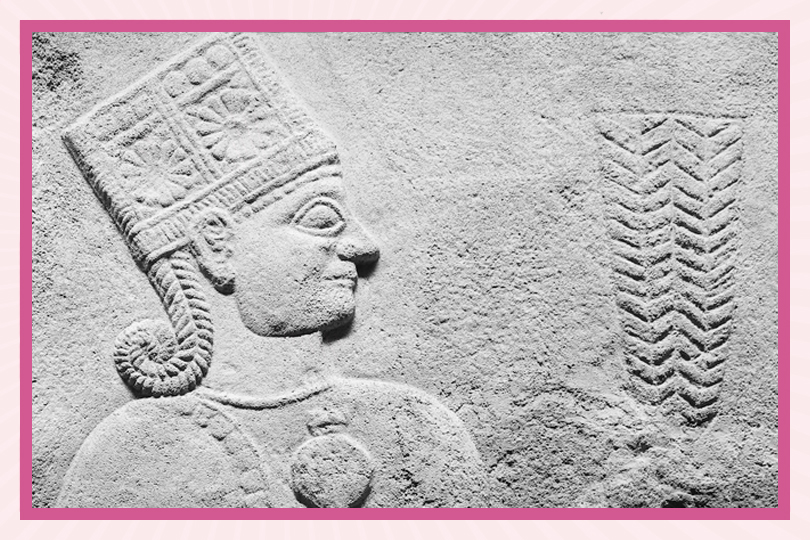By Sienna Vittoria Asselin
Just a few weeks ago, on September 8, Queen Elizabeth II died at the age of 96 after ruling for 70 years—making her Britain’s longest reigning monarch. If this has you thinking about queens and female power, you’re not alone. If we look back, it’s obvious that there have been fewer reigning kings than queens. However, even though female rulers have been relatively rare, it’s strikingly apparent that many of the queens who did rule, did so for an extraordinarily long time. For example, in Britain, Queen Victoria sat on the throne for 64 years, and Queen Elizabeth I ruled for 45 years. And in other parts of the world, we find examples of successful female rulers like Dowager Empress Cixi, who ruled in China for nearly half a century.
But there’s one female ruler whose name almost never comes up in these conversations: Queen Kubaba of Sumer, believed to be the first recorded female monarch of all time. What do we know about this fascinating and underrated historical figure? Read on for a look at the life and legacy of Kubaba, an ancient Mesopotamian queen who started out as a tavern-keeper.
The Early Years
Kubaba’s story brings us back to the Early Dynastic times, approximately 2500 BCE (therefore more than 4000 years ago).
One of the reasons that Kubaba (also spelled Ku-Baba, Kubau, and Kuh-Bau) is so unknown in today’s age is likely because there are so few sources on her life. The main source we have for her life is the Sumerian King List, which is exactly what it sounds like: an ancient text written in Sumerian that lists the kings who ruled over Sumer (modern-day Iraq, then a part of Mesopotamia). The list briefly notes the length of each individual reign and the city in which the king reigned. But even this source’s reliability has been called into question—some rulers are credited with ruling for thousands of years. In fact, the list seems to blur the line between history and legend.
Nevertheless, amidst the long line of Sumerian kings stands one woman: Kubaba from the Sumerian city of Kish.
Before becoming queen, Kubaba was a “tavern-keeper.” This might not sound like the most glamorous job, and some scholars have interpreted this as meaning she was a “barmaid” and thus linked her to prostitution. Scholar Claudia E. Suter writes in The Sumerian World that Kubaba was sometimes characterized as a brothel keeper, which was a way of belittling her, and demonstrates the “attitude towards women in the male-dominated early Mesopotamian establishment.”
But brewing and selling beer in the ancient Mesopotamian world was a highly respectable endeavour. There was an ancient association between female divinity and alcohol, and according to theologist Carole R. Fontaine, Kubaba would have been seen as a “successful business woman.”
Kubaba: Queen of Sumer
The Sumerian King List says that after the previous king was defeated, the “kingship was taken to Kiš,” where Kubaba took the throne. This refers to how, in ancient Sumer, the capital of power moved from city to city.
The list says that once power transferred to Kish, Kubaba became the next king. Rivkah Harris, PhD, writes in Gender and Aging in Mesopotamia, that Kubaba was the first and only woman to rule in ancient Mesopotamia.
She was referred to as lugal (king), not as eresh (queen), meaning that she was not a “queen consort” in the traditional sense, meaning the wife of a king. Rather, she ruled as a queen regnant in her own right as though she were a king.
The text does not give too much of an indication on how she became the ruler. Historian Marten Stol writes in Women in the Ancient Near East that Kubaba was known as a “brave warrior.” She was given different epithets over time, such as “she who rules the country” or “she who seized the kingship.” Some sources, therefore, say she was a usurper. According to Harris, a man usurping the throne was “neither uncommon nor a heinous event in Mesopotamian history,” but it was very frowned upon for a woman to do so.
Nevertheless, the King List list goes on to say that she “made firm the foundations of Kiš,” perhaps meaning that she fortified it against invaders. It also states that she “ruled for 100 years,” a number likely exaggerated as her story became mythologized, but still indicating a lengthy rule. The fact that the scribe who wrote the King List went so far as to add that she made the city’s foundation firm is remarkable, considering many of the other entries listing the various kings only include their name and length of their reign, and nothing about the quality of their reign.
Unfortunately, we don’t know much more about her time in power, but some sources say it was during a period of relative peace.
Legacy and Legend
As time went on, Kubaba’s reign was increasingly seen as an exception to the rule, unnatural because she was female. When strange or “evil” things happened to the land, later generations said it was due to the “omen of Kubaba.”
One ancient passage said that the birth of a baby with both male and female genitalia was due to the “omen of Kubaba.” This connection demonstrates an insecurity about perceptions of gender connected with her reign, since they saw her as crossing the boundary into the male territory of leadership. Another later text said that if a patient’s lung didn’t look good, it was due to the “omen of Kubaba.”
Furthermore, as the years passed, confusion grew around the distinction between the Sumerian Queen Kubaba and the goddess Kubaba, protectress of the Syrian city of Carchemish. The relationship between the goddess and the actual historical figure is unclear and over time, the goddess’ reputation increased as the real woman’s name faded from the record.
Now, Kubaba is little more than a footnote in history books, and the information we have about her is dismally scant. But her story is a fascinating tale of female power and we can only hope that more information comes to light in the future.











